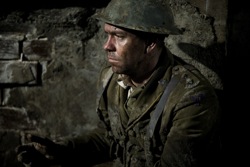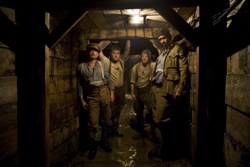
Peter Weir’s Gallipoli was part of the wave of films that asserted Australia’s cultural independence from Britain by helping to create the image of the heroic, anti-authoritarian and noble Australian soldier. It damned the way Australian soldiers were commanded by their inept and callous British superiors and it showed the world just how big a part Australians played in World War I and how great their sacrifice was. Beneath Hill 60 is the latest film to do all these things and it is based on the true story of a platoon of Australian miners who helped to fight World War I by tunnelling under the Western Front to place explosives underneath the German forces.
The commander of the Australian Tunnelling Company is Captain Oliver Woodward, whose actual diaries formed the basis of writer/co-producer David Roach’s script. Played by Brendan Cowell (Noise), the audience first encounter Woodward lost in the maze of tunnels under the enemy lines. The low light and muted sounds of explosions far up on the surface make the tunnel settings incredibly claustrophobic for the audience (the cinematography and sound design are magnificent), recalling the cramped submarine sets of Das Boot. When Woodward does get back to the surface and walks out in the trenches the film shows us the bewildering chaos and violence of trench warfare making the tunnels seem pleasant in comparison. No wonder Woodward feels ‘snug’ while underground.
 The scenes in the tunnels and trenches are fabulous and director Jeremy Hartley Sims (Last Train to Freo) does a fine job creating tension and excitement as well as depicting the dynamics between the various soldiers. The characters do all somewhat represent the sort of stock characters you so often find in war films: the good bloke commander, the stuffy and clueless officers who insist on protocol over common sense, the naive young soldier and the tough guy who turns out to be all right. However, Sims and the cast work well together to overcome the stereotypes and create a genuine sense of camaraderie among a diverse group of men. Beneath Hill 60 also admirably depicts the German perspective in a way that highlights how much both sides had in common rather than simply depicting the Germans as the enemy.
The scenes in the tunnels and trenches are fabulous and director Jeremy Hartley Sims (Last Train to Freo) does a fine job creating tension and excitement as well as depicting the dynamics between the various soldiers. The characters do all somewhat represent the sort of stock characters you so often find in war films: the good bloke commander, the stuffy and clueless officers who insist on protocol over common sense, the naive young soldier and the tough guy who turns out to be all right. However, Sims and the cast work well together to overcome the stereotypes and create a genuine sense of camaraderie among a diverse group of men. Beneath Hill 60 also admirably depicts the German perspective in a way that highlights how much both sides had in common rather than simply depicting the Germans as the enemy.
What does let Beneath Hill 60 down are its flashback scenes depicting Woodward in Australia before he joined the Tunnelling Company. These scenes could have provided an important contrast to the war scenes but instead feel like a hurried afterthought with trite dialogue and noticeably weaker acting. The film’s intrusive score doesn’t help either and is at its most melodramatic during these flashbacks. Otherwise Beneath Hill 60 is a strong film telling an important story and while it won’t have the same impact as Gallipoli, it is still a film of significance.
![]()

I really agree with you on this one Thomas. I thought it could have been a much more impressive film without the flashback sequences – they just didn’t work at all and I fear that they remained only so Jacqueline McKenzie wouldn’t be cut from the film (although admittedly she was fine).
What I did think was the most interesting part of the film was the way in which the tunnels, which at first seems so claustrophobic and foreboding gradually become more like a sanctuary from the horrors going on outside.
And Brendan Cowell is becoming a ‘bloody good’ actor!
The great thing about our Aussie films is that you can tell the bad guys:
They have Pom accents.
Whatever Gallipoli achieved, it was derived from false history. The officer shown ordering the later attack waves at the Nek had a plummy Pom accent. In real life that officer was an Aussie called Antill, who went on to higher ranks despite being regarded as profligate and incompetent, especially by the Kiwis at Anzac
Why do we have to rely on myth to gild the fantastic achievements of our men? They are remarkable enough without resorting to spiteful inaccuracies
Historical accuracy in cinema is a very tricky issue. Films should never be taken as historical fact but as they do enter our collective consciousness then I suppose filmmakers have some responsibility to how they present the past. But films, especially narrative driven ones, do have to compromise in order to tell a compelling story in 90-120 minutes and for this reason they should never be confused with documentaries. Furthermore, history is always open to interpretation too. Historical films should therefore be taken as representations of the past and in the case of Gallipoli it did use the English officer characters to represent the generally very poor treatment of ANZAC soldiers by the English. After all, the whole incident was the result of an English military blunder.
Gallipoli was at the time also making an important statement about contemporary Australia’s need to culturally sever its ties with England by reminding audiences of one of the many reasons why Australians shouldn’t feel a subservient loyalty towards the English. You can also argue that Gallipoli, and more so ‘Breaker’ Morant, were, in light of the Vietnam War, commenting on Australia’s tendency to follow other countries into war at our own great and needless expense.
So I think there is a good reason for Australian war films to portray the English officers in a negative light and in the case of Antill I believe he was forced to do what he did by his English superiors.
Interesting comments about Beneath Hill 60. I agree with Thomas Caldwell that while feature films should be as accurate as possible they should be never be taken as “complete histories” nor should they be seen as documentaries. We were very aware that the stuck up British Officer has become something of a cliché in Australian war films and decided not to go too far down that path. So while some critics have commented on the “pom officer”, (played by Chris Haywood,) in fact, Chris plays an Australian Officer, and is clearly wearing an Australian Officer’s uniform. There is much research that points to the fact that many Australian Officers tried to be “more British than the British”. Chris plays the character with the appropriate accent.
My father was a member of the A.T.C. and I can vouch for the terrible conditions under which they operated the scars never left him up until the day he passed away in hospital where he spent most of his time following his discharge from the military in 1919
To get some insight into tunneling operations War Underground offers some detail into the people that made up “tunnelers” the majority were drawn from the mining community primarily coal mining in the instance of the British contingent albeit those drawn from the colonies like my father had worked in the gold mines at Ballarat and other such areas. A comparison of the physical differences between the British and colonial miners indicates that unlike the A.T.C. the British contingent were in many instances undernourished and sickly leaving them open to many problems the colonials did not suffer from, albeit they displayed the same level of bravery that was required in such operations.